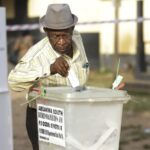General
‘We never truly transitioned’ – Yaw Nsarkoh criticises Ghana’s flawed democracy
The former Executive Vice President of Unilever Ghana and Nigeria, Yaw Nsarkoh, says Ghana’s experiment with democracy was never real; it was only performative. He argues that what passes for democratic governance in Ghana is, in fact, a sophisticated illusion—more concerned with optics than subs...
MyJoyOnline
published: Jun 24, 2025


The former Executive Vice President of Unilever Ghana and Nigeria, Yaw Nsarkoh, says Ghana’s experiment with democracy was never real; it was only performative.
He argues that what passes for democratic governance in Ghana is, in fact, a sophisticated illusion—more concerned with optics than substance.
“We never truly transitioned,” he declared on JoyNews’ PM Express on June 23, following his lecture at the Ghana Academy of Arts and Sciences titled Iniquities of Iniquity in Our Santa Claus Democracy.
“It was a reluctant transition. We opened up space just a little bit so that we could say the forms of democracy had been put in place and that we had democratised.”
Nsarkoh’s critique is blistering and rooted in both history and structural realities.
Referencing the late Nigerian political economist Claude Ake, he said Ghana is a textbook case of how African states often liberalise just enough to check boxes, never enough to empower citizens or dismantle entrenched systems of control.
“We’re reduced to voters, not citizens. It’s a public auction for the highest bidder,” he warned.
“You and I could be in the drug trade, carry sacks of cash and sponsor candidates. Once they win, we start making demands. That’s the chain reaction.”
At the heart of his concerns is the near-complete absence of transparency in political financing.
“If I asked you how much money the sitting President spent on his campaign, or how much his main opponent spent, you couldn’t answer. Even as a media person, you don’t know. No one does.”
He contrasted this opacity with mature democracies where campaign fundraising and expenditure are routinely disclosed and scrutinised.
“In the U.S., you’ll hear on TV: this candidate raised this much, that one spent that much. But in Ghana, we’re in the dark. Why?”
According to Mr Nsarkoh, the failure to regulate campaign financing is the “root of all evil” in Ghana’s political ecosystem.
It creates a system where power is captured by money—often illicit money—and the political process is compromised before a single vote is cast.
“People don’t sponsor campaigns out of goodwill. They expect payback. Contracts, positions, and impunity. It’s systemic. We like to name and shame individuals, and that’s fair. But the deeper problem is the design.”
He challenged the very structure of Ghana’s democracy, arguing that after more than three decades, the same foundational flaws continue to replicate themselves.
“Three and a half decades in, and we’re still here. We haven’t built the institutions. We haven’t enforced the rules. We just tweak the faces.”
Nsarkoh’s remarks go beyond critique. They are a call to action. He urged Ghanaians to rethink their role in governance, not just as voters but as participants with a duty to demand transparency and accountability.
“We must move beyond personality politics. These are design issues. It’s time we fixed the system.”
And he warned of the cost of inaction.
“If we keep treating democracy like Santa Claus, where people come bearing gifts and disappear until the next election, we’ll keep having the same problems. Only the faces will change.”
For Mr Nsarkoh, Ghana’s democracy has not failed because of bad people.
He believes it has failed because it was never structurally equipped to succeed. “The forms are there. The substance never came,” he said.
Read More